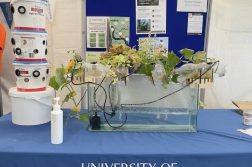Invasive non-native species are causing numerous extinctions worldwide. Unfortunately, we have only ourselves to blame.
Invasive Alien Species (IAS), are non-native species which have been introduced into a new area by humans, they have the potential to become problematic. They can destroy infrastructure, decrease crop yield and threaten native plants and animals.
Humans may intentionally or accidentally introduce the plants and animals into a new location. Humans may deliberately transport the organisms to the new location and then the species can go on to escape and reproduce in the wild. Alternatively, human activities, such as flying, driving and sailing can provide a pathway through which the species can travel.
Zebra mussels are indigenous molluscs in Eurasia. They were transported to Europe by boats. Some such to the bottom of the vessels, some were released to Europe in the ballast water ejected from ships. Not only do the mussels harm native species, but they also damage the ships they attach to and destroy water pipes.
The UK government have strict rules preventing the release of IAS into the wild and anyone found doing so may face imprisonment and hefty fines. There are some instances when non-native plants and animals can be useful and can even reduce numbers of IAS by predation. Although, these practices must be carefully monitored by ecological experts.
People have argued that IAS do have some redeeming qualities. We can use them as a source of food, for example, in the UK we eat signal crayfish, an IAS. Moreover, we can use plant extraction of non-natives, to produce medicines curing harmful diseases. And for some people, in particular, those living in cities, interactions with the invaders, such as the Grey squirrel, is the only relationship with wildlife they experience.
Together, by following government guidelines, and by raising awareness of IAS, we can help prevent their spread and protect our indigenous plants and animals.



